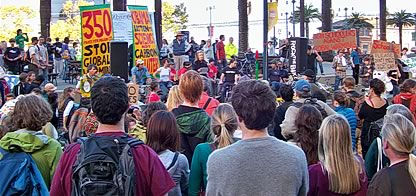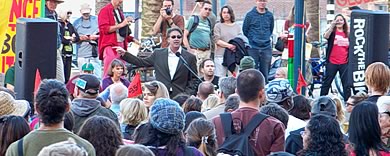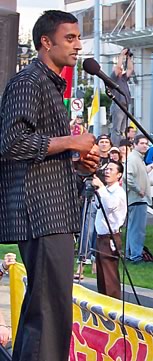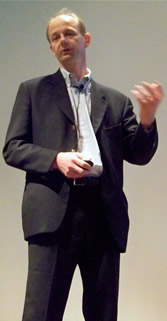Oct 24, 2009 San Francisco, CA.

Demonstrations were held around the world Saturday to focus attention on the atmospheric CO2 target of 350 parts per million. This is the amount considered safe by many climate scientists, including NASA climatologist James Hansen, and promoted globally on this ‘International Day of Climate Action’, by 350.org. The current atmospheric quantity of CO2 is 386 ppm, and according to many projections it will be extremely challenging to prevent levels from reaching 450 ppm in coming decades.
The gathering in San Francisco comprised a diverse inter generational crowd who came together to hear speeches, poetry, music, and to form a human image of the number 350, similar to so many images of the number 350 from around the world. The amplified sound for the event was powered by volunteers pedaling bicycle electricity generators.

The five o’clock chimes began ringing in at Justin Herman Plaza as SF City Supervisor Ross Mirkarimi began to speak:
“I want to thank everyone who made the commitment to be here. I want to thank Greenpeace, I want to thank climatechange.org, I want to thank all the environmentalists and all those advocates who saw fit to draw a line in the sand to tell our national leaders, and to tell our allies, and to tell all those who will be congregating at Copenhagen that we absolutely insist on having an effective and accountable climate change plan that takes care of the decades of degradation.”
“We are mobilizing to broadcast and to amplify our message across the sea, across all continents. It is absolutely inspiring that there are hundreds and hundreds of cities who are having concurrent actions like this – that there are veterans of this movement, and newcomers of this movement, generations of this movement to save our environment, to save endangered habitats, to save humanity, to save our mother earth, because they realize that the clock ticks for us.”
Expressing the growing frustration among environmentalists over the pace and direction of climate legislation, Mirkarimi said:
“We’re determined and we’re resolved – we understand where lines in the sand must be drawn. In Washington – even those who we gleefully elected and enthusiastically elected into Congress or the White House – liberal or not, we have no time for them to get with it.”

Farm Sanctuary’s Walk for Farm Animals contingent marched down Market Street to join the larger demonstration, drawing attention to both the disastrous effects of factory farming on climate change as well as to cruelty to farm animals. Many of the people in this group are vegan or vegetarian.
 Gopal of Movement Generation addressed the crowd about climate change within the context of environmental justice.
Gopal of Movement Generation addressed the crowd about climate change within the context of environmental justice.
“We are not on the brink of an ecological crisis, we are in one. We absolutely have to get off that system”
Gopal stressed equity issues and community based struggle to defend people’s rights – including environmental rights such as clean air and water.
“Getting to 350 is only one piece of this puzzle. What really matters is how we get to 350. Are we going to believe the lies and false solutions of the system that got us here? Are we going to allow the corporations who created the problem – are we going to allow the empire that built its privilege on the backs of people all over the planet to craft the solutions or are we going to take control and craft those solutions ourselves?”
“There’s another lie that they want us to believe – that we are all in the same boat. We are not all in the same boat. We are all part of the same fleet, floating on the same ocean, heading to the same iceberg. But the big ship has put all the little ships up front, and are figuring that that’s going to buffer the impact of hitting that iceberg.”
 “Poor people all over this planet are the least responsible for creating this problem. They are the first hit, they are the hardest hit,and they also hold the key to our survival. Indigenous peoples, Land based peoples, traditional knowledge, that is what we need to survive. We need to honor it, we need to cultivate it in ourselves, we need to rebirth it in our communities.”
“Poor people all over this planet are the least responsible for creating this problem. They are the first hit, they are the hardest hit,and they also hold the key to our survival. Indigenous peoples, Land based peoples, traditional knowledge, that is what we need to survive. We need to honor it, we need to cultivate it in ourselves, we need to rebirth it in our communities.”
“The solutions will not come from the corporate haven that is Copenhagen, they will come from the actions of everyday people, organizing together, in together in our communities building power from the bottom up.”
“The story of the solution to our problems to our problems begins with the communities on the ground on the front lines of the root causes of this problem. The communities in Richmond who are fighting Chevron, the communities in Appalachia who are fighting coal, the communities in Alberta who are fighting tar sands. Indigenous peoples all over this planet fighting to protect their forests and their livelihoods. Fisher folk all over this planet fighting industrial trolling. Those communities on the front line of this struggle are the source of our solutions. They will band together with us in a multisectoral people’s movement all over this planet and here in the United States, and we will exercise our people power in the streets to drive those rights based policies that protect people all over this planet, that protect people all over this planet, that protect the rights of women, that protect the rights of workers.That protects the rights of indigenous peoples, and that protect my right and your right to clean air, to fresh water to healthy food, and to safe places to live and breath every day.”
“That is the solution we need. We will not convince the policy makers, the corporate controls or the government of the United States to do it for us. We will make them do it, we will make them do it every day all the time.”
 Gopal went on to recall the demonstrations of December 1999 in Seattle against the World Trade Organization which took many by surprise:
Gopal went on to recall the demonstrations of December 1999 in Seattle against the World Trade Organization which took many by surprise:
“Now imagine waking up on Dec 1 1999 and learning about the WTO for the first time by watching it collapse on TV. Well that moment is upon us again exactly 10 years later. In December 2009 the same people, the same forces, are going to amass again in Copenhagen, and it is not just about carbon in the atmosphere, it is about global finance, it is about forests it is about rights, it is about healthcare, it is about everything about our lives. And if we do not organize together to make sure that people are put first, the rights of profit will rule.”
 I interviewed Gopal as the demonstration was ending. He said did not expect an agreement to be reached in Copenhagen, and was critical of the proposed legislation in the United States:
I interviewed Gopal as the demonstration was ending. He said did not expect an agreement to be reached in Copenhagen, and was critical of the proposed legislation in the United States:
“The idea that any bill is better than no bill is a lie. The climate legislation that came through the Congress and the climate legislation that will likely to come through the senate is worse than nothing. It’s not that it doesn’t go far enough -it’s that it goes down the wrong road.”
Q: Why are you opposed to cap & trade?
“First of all there’s actually no real need for complicated, sophisticated, speculative financial instruments for trading in pollution and what is essentially the commodification of atmospheric space – which is turning it into a commodity which can be bought and sold on a market – when solutions are much simpler and much easier to make accountable much more transparent and much easier to verify. For example, an immediate moratorium on all new exploration for any fossil fuels. We know that fossil fuels cause the problem, so today, we could take every penny that the fossil fuels industry spend in looking for new fossil fuels and just say “you can’t do that anymore” and all that has to go into clean technology, into green jobs, into worker transition, into working training programs, into a just transition program. We know that oil is there, but we know that is drilling for it an using that oil is catastrophic to life on this planet and so we’re going to make a ban on that.”
“We could institute a cap and tax. We could set a limit. If you stay within it you get charged a certain amount, if you go over by a certain percent you get charged at one rate, if you go over by another percent you get changed at a higher rate. We set that, the cap goes down every year. We set maybe a five year limit, if after five years you can’t get your corporation you business you industry your industrial activity within the cap then we’re going to revoke your corporate charter.”
Q: One benefit that has been attributed of cap & trade is that it allows for transfer of wealth from Northern countries to Southern nations. Can cap and tax solutions allow for transfer of wealth to developing nations?
“Yes. In Copenhagen one of the sticking points that’s going to get fought over between the “industrial Northern countries” and the “global South” is whether were going to have a “market based mechanism” for financing which cap & trade is, or whether were going to have a funds based mechanism. Now, everybody’s familiar with the debt, that poor countries owe to the Northern countries through the World Bank or the IMF, that industrial countries give out loans to do really bad things and then make you pay them back over hundreds of years.”
“Well there’s another kind of debt called an ecological debt. It’s the debt that the industrial North, that we owe to people all over the planet, to the countries of the Global South for five hundred years of resource colonization and exploitation. We’ve built our civilization off of the backs of other peoples resources and over exploiting common resources like atmospheric space, which nobody should get to own, or fresh water, which nobody should get to own. And so if we start looking at ecological debt as a framework for looking at how we’re going to finance technology transfer, and how we’re going to finance solutions in the global South and equity, then there’s a whole new set of options on the table, a funds based mechanism, where the industrial North, the taxation of carbon from polluting activity goes into a fund and that fund is distributed on the basis of equity to countries in the Global South. It’s a verifiable system, it can be a transparent system. It can be a democratic system.”
“The United States is the single largest contributor to greenhouse gases historically. What’s fair is that we do more than anyone else to deal with the problem. We have built our society on the backs of other people. What’s fair is that we give back a little bit now.”
Article by James George

 Carten Hein Westergaard, of Vestas Technology R& D Americas, Inc., spoke at the Univeristy of California Berkeley today on wind power – or more accurately,
Carten Hein Westergaard, of Vestas Technology R& D Americas, Inc., spoke at the Univeristy of California Berkeley today on wind power – or more accurately,  Wind turbines look relatively simple from a distance, but Westergaard pointed out there are real engineering challenges to assembling, installing and maintaining wind turbines with a twenty year lifespan. In real world conditions, they face multiple and ongoing stresses, including such things as lightning and gale winds which can reach 32 meters/sec. To service the turbines, Carsten showed an image of an
Wind turbines look relatively simple from a distance, but Westergaard pointed out there are real engineering challenges to assembling, installing and maintaining wind turbines with a twenty year lifespan. In real world conditions, they face multiple and ongoing stresses, including such things as lightning and gale winds which can reach 32 meters/sec. To service the turbines, Carsten showed an image of an  "I believe that people around the world have a right to know exactly what their governments will do to address dangerous climate change. And this session has shown that it can be done, all the ingredients for success are on the table, and what we must do now is step back from self interest and let common interest prevail.
"I believe that people around the world have a right to know exactly what their governments will do to address dangerous climate change. And this session has shown that it can be done, all the ingredients for success are on the table, and what we must do now is step back from self interest and let common interest prevail.